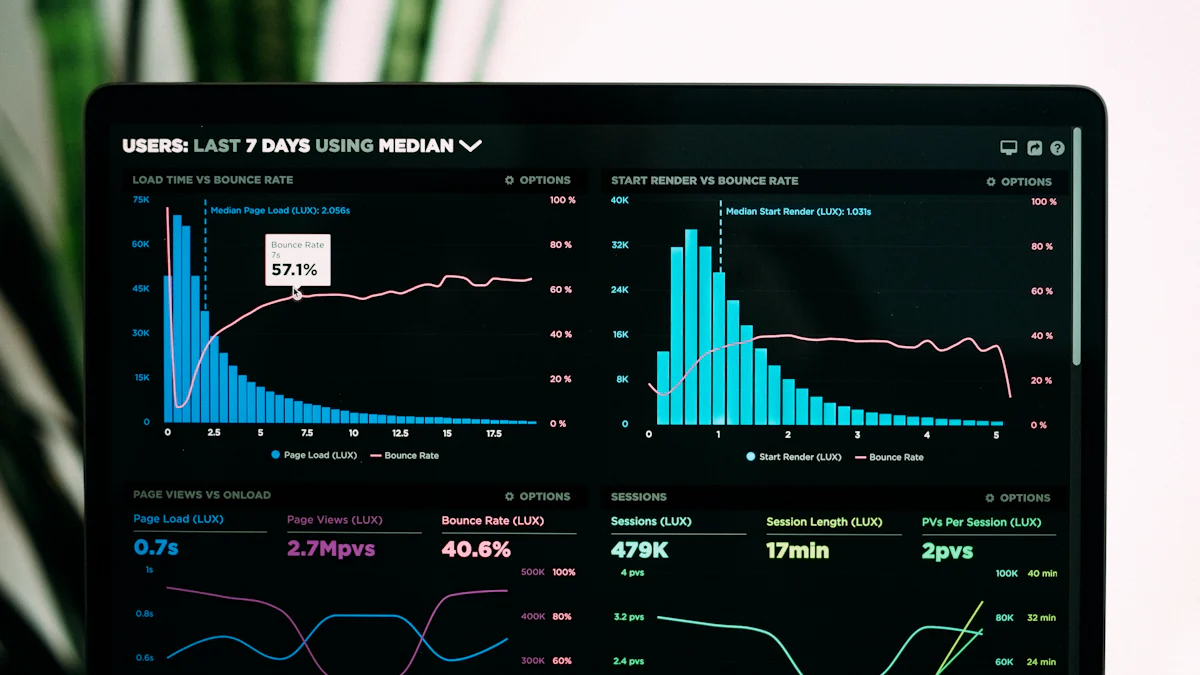Analyzing AI's Impact on Logistics Forecasting

Artificial Intelligence (AI) has transformed various industries. AI's integration into logistics forecasting has revolutionized supply chain management. Accurate logistics forecasting is crucial for efficient operations. AI enhances this by analyzing historical data and market trends. AI adoption in logistics is growing rapidly. For instance, 35% of businesses have incorporated AI into their operations. Retailers lead with 72% using AI. These advancements promise significant improvements in accuracy and efficiency.
The Evolution of Logistics Forecasting
Traditional Methods
Historical Data Analysis
Historical data analysis has long been a cornerstone of logistics forecasting. Companies rely on past sales data to predict future demand. Analysts look at trends and patterns to make educated guesses. This method assumes that future sales will mirror past performance. For instance, a new product might be expected to sell similarly to an existing one with a comparable sales history.
Expert Judgment
Expert judgment involves seasoned professionals making forecasts based on their experience. These experts consider various factors like market conditions and consumer behavior. Their insights often fill gaps left by data analysis. Businesses value expert opinions for their nuanced understanding of the industry.
Limitations of Traditional Methods
Inaccuracy and Delays
Traditional methods often suffer from inaccuracy. Historical data may not account for sudden market changes. Expert judgment can be subjective and inconsistent. Both methods can lead to delays in decision-making. Slow responses to market shifts can result in lost opportunities and increased costs.
High Costs and Resource Intensity
Traditional forecasting methods require significant resources. Data collection and analysis demand time and money. Employing experts adds to the cost. These methods also involve manual processes, which are labor-intensive. High resource demands make traditional methods less efficient and more expensive.
Introduction to AI in Logistics
What is AI?
Definition and Key Concepts
Artificial Intelligence (AI) refers to the simulation of human intelligence in machines. These machines perform tasks that typically require human intelligence. Examples include learning, reasoning, and problem-solving. AI systems use algorithms to process data and make decisions.
Types of AI Technologies
Several types of AI technologies exist. Machine learning involves training algorithms on large datasets. Deep learning uses neural networks to mimic human brain functions. Natural language processing (NLP) enables machines to understand and respond to human language. Image recognition allows AI to identify objects within images.
AI Applications in Logistics
Machine Learning Algorithms
Machine learning algorithms play a crucial role in logistics. These algorithms analyze vast amounts of data. They identify patterns and trends that humans might miss. For example, machine learning can optimize route planning. This reduces fuel consumption and delivery times. Companies like JUSDA use machine learning to predict arrival times more accurately.
Predictive Analytics
Predictive analytics enhances logistics forecasting. AI analyzes historical data to predict future demand. This helps companies manage inventory more efficiently. Predictive analytics also improves fleet performance visibility. Planners can strategically position assets and reduce unnecessary risks. According to McKinsey research, early adopters of AI in supply chains have seen logistics costs decrease by 15%.
AI applications in logistics offer numerous benefits. These technologies improve accuracy and efficiency. They also reduce costs and optimize resources. Embracing AI in logistics can lead to significant competitive advantages.
AI-Driven Logistics Forecasting

Enhanced Accuracy and Efficiency
Real-time Data Processing
AI processes data in real-time. This capability allows logistics companies to respond quickly to changes. For example, AI can analyze traffic patterns to optimize delivery routes. Real-time data processing reduces delays and improves delivery times. Companies benefit from increased efficiency and customer satisfaction.
Improved Demand Forecasting
AI enhances logistics forecasting by predicting future demand more accurately. Machine learning algorithms analyze historical sales data and market trends. These insights help businesses anticipate customer needs. Improved demand forecasting leads to better inventory management. Companies can avoid stockouts and overstock situations. This optimization reduces costs and increases profitability.
Cost Reduction and Resource Optimization
Automated Decision-Making
AI automates decision-making processes in logistics. Algorithms evaluate multiple variables to make informed choices. For instance, AI can determine the best shipping methods based on cost and time. Automated decision-making reduces human error and speeds up operations. Businesses save money and resources by implementing AI solutions.
Inventory Management
AI optimizes inventory management by providing accurate forecasts. Predictive analytics helps companies maintain optimal stock levels. AI considers factors like current stock, future sales, and supply chain constraints. Effective inventory management reduces holding costs and minimizes waste. Companies achieve higher efficiency and better resource utilization.
According to McKinsey research, early adopters of AI in supply chains have seen logistics costs decrease by 15%. AI's integration into logistics is expected to grow significantly. By 2026, AI adoption in logistics could rise from 12% to 60%. These advancements highlight the importance of embracing AI technologies.
Case Studies and Real-World Examples

Successful Implementations
Company A's Experience
Company A faced challenges with understocking and overstocking. These issues led to inefficiencies and increased costs. The company decided to integrate AI into its logistics forecasting. Machine learning algorithms analyzed historical sales data and market trends. This approach improved demand predictions and inventory management.
The results were significant. Company A reduced stockouts by 30%. Overstock situations decreased by 25%. The company also saw a 15% reduction in logistics costs. These improvements enhanced overall supply chain efficiency. The success of Company A demonstrates the transformative power of AI in logistics.
JUSDA'S ETA Program
JUSDA employs advanced logistics forecasting techniques. The company developed a dynamic ETA (Estimated Time of Arrival) intelligent algorithm. This algorithm integrates machine learning, neural network models, and dynamic/static prediction models. Extensive vessel data also plays a crucial role.
The dynamic ETA algorithm predicts arrival times at destination ports more accurately. This capability improves operational efficiency and reduces costs. The algorithm provides timely and accurate logistics anomaly warnings. These warnings help reduce the risk of supply chain disruptions. JUSDA's experience highlights the benefits of AI in enhancing supply chain efficiency.
Lessons Learned
Challenges Faced
Implementing AI in logistics forecasting presents challenges. Companies often face difficulties with data integration. Legacy systems may not support new AI technologies. Data quality can also be an issue. Inaccurate or incomplete data affects AI performance.
Another challenge involves the cost of implementation. AI solutions require significant investment. Companies need to consider the return on investment. Training staff to use AI tools effectively is also essential. Overcoming these challenges requires careful planning and resource allocation.
Best Practices
Several best practices can help companies succeed with AI in logistics forecasting:
Invest in high-quality data: Accurate data is crucial for AI performance.
Ensure system compatibility: Integrate AI with existing systems smoothly.
Focus on training: Equip staff with the necessary skills to use AI tools.
Monitor performance: Regularly evaluate AI solutions to ensure effectiveness.
Plan for scalability: Prepare for future growth and expansion of AI capabilities.
Following these best practices can lead to successful AI implementation. Companies can achieve significant improvements in efficiency and cost reduction.
Future Trends and Developments
Emerging AI Technologies
AI and IoT Integration
AI and the Internet of Things (IoT) are transforming logistics. IoT devices collect real-time data from various sources. AI analyzes this data to make smart decisions. For example, sensors on trucks monitor conditions. AI processes this information to optimize routes. This integration reduces delays and improves efficiency. Companies can track shipments more accurately. Real-time updates enhance customer satisfaction.
Advanced Predictive Models
Advanced predictive models are changing logistics forecasting. These models use machine learning to analyze complex data. AI identifies patterns that humans might miss. Predictive models forecast demand with high accuracy. Businesses can plan inventory better. This reduces overstock and stockouts. Companies save money and resources. McKinsey research shows early AI adopters cut logistics costs by 15%. AI-driven models offer a competitive edge.
Potential Challenges
Ethical Considerations
AI in logistics raises ethical questions. Automated decisions impact jobs. Workers may fear job loss due to AI. Companies must address these concerns. Transparency in AI use is crucial. Businesses should explain how AI makes decisions. Ethical AI practices build trust. Companies need to ensure fair treatment of employees. Balancing technology and human roles is essential.
Data Privacy Issues
Data privacy is a major concern with AI. Logistics companies handle vast amounts of data. Protecting this data is critical. Unauthorized access can lead to breaches. Companies must implement strong security measures. Compliance with regulations is necessary. Customers value their privacy. Ensuring data protection builds customer trust. Businesses must stay vigilant against cyber threats.
According to McKinsey, AI could boost logistics productivity by over 40% by 2035. Embracing AI technologies offers immense potential. However, addressing challenges is vital for sustainable growth.
AI has revolutionized logistics forecasting by automating tasks and providing real-time data analysis. AI's ability to make accurate forecasts enhances supply chain management. Companies adopting AI see significant improvements in efficiency and cost reduction.
The evolution of AI in logistics continues to show promise. Emerging technologies like AI and IoT integration offer new possibilities. Advanced predictive models provide deeper insights into demand forecasting. These advancements ensure businesses stay competitive.
Embracing AI is crucial for gaining a competitive edge. AI transforms logistics operations, making them more efficient and responsive. Companies that leverage AI will lead the industry and achieve sustainable growth.
See Also
Exploring AI's Role: Logistics Revolution Explored
Tomorrow's Logistics Revolution: AI Supply Chain Evolution
Efficiency Unleashed: Innovations in AI Supply Chain
